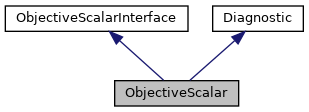ObjectiveScalar Class Referenceabstract
scalar objective function with scaling More...
#include <numeric_optimization.h>
Inheritance diagram for ObjectiveScalar:

Public Member Functions | |
| ObjectiveScalar (int n, std::string t) | |
| const std::string & | tagof (void) const |
| returns the tag of the instance More... | |
| void | settagof (std::string t) |
| sets the tag of the instance More... | |
| virtual void | calculateResidual (void)=0 |
| open formulation; evaluates the residual More... | |
| void | operator() (double *, double &, double *) override |
| implements the () operator by calling calculateResiduals More... | |
| int | size (void) const |
| returns the current size of the problem More... | |
| void | resize (int n) |
| changes the size of the problem, resizing arrays as required More... | |
| void | inactivate (void) |
| inactivates all unknowns More... | |
| virtual void | operator() (double *, double &, double *)=0 |
 Public Member Functions inherited from Diagnostic Public Member Functions inherited from Diagnostic | |
| Diagnostic (void) | |
| void | setVerbosity (int verbosity) |
| sets the verbosity level for this instance More... | |
| int | verbosity (void) const |
Protected Attributes | |
| std::string | TAGof |
| Descriptive tag for the ObjectiveScalar. More... | |
| std::vector< Scaler > | scaler_ |
| provide scaling and unscaling More... | |
| std::vector< Value * > | xp_ |
| pointers to the unknowns More... | |
| Value | y_ |
| Residual. More... | |
 Protected Attributes inherited from Diagnostic Protected Attributes inherited from Diagnostic | |
| int | verbosityInstance |
Additional Inherited Members | |
 Public Attributes inherited from ObjectiveScalarInterface Public Attributes inherited from ObjectiveScalarInterface | |
| int | verbosityLocal |
 Protected Member Functions inherited from ObjectiveScalarInterface Protected Member Functions inherited from ObjectiveScalarInterface | |
| ~ObjectiveScalarInterface () | |
 Protected Member Functions inherited from Diagnostic Protected Member Functions inherited from Diagnostic | |
| virtual | ~Diagnostic ()=default |
Detailed Description
scalar objective function with scaling
#include <libpf/core/numeric_optimization.h>
- Remarks
- Warning
- Thread safe:
- Extendable:
- Platform dependencies:
Constructor & Destructor Documentation
◆ ObjectiveScalar()
| ObjectiveScalar::ObjectiveScalar | ( | int | n, |
| std::string | t | ||
| ) |
Default constructor
- Parameters
-
t descriptive tag n number of degrees of freedom
Member Function Documentation
◆ calculateResidual()
|
pure virtual |
open formulation; evaluates the residual
◆ inactivate()
| void ObjectiveScalar::inactivate | ( | void | ) |
inactivates all unknowns
◆ operator()()
|
overridevirtual |
implements the () operator by calling calculateResiduals
Implements ObjectiveScalarInterface.
◆ resize()
| void ObjectiveScalar::resize | ( | int | n | ) |
changes the size of the problem, resizing arrays as required
◆ settagof()
| void ObjectiveScalar::settagof | ( | std::string | t | ) |
sets the tag of the instance
◆ size()
| int ObjectiveScalar::size | ( | void | ) | const |
returns the current size of the problem
◆ tagof()
| const std::string & ObjectiveScalar::tagof | ( | void | ) | const |
returns the tag of the instance
Member Data Documentation
◆ scaler_
|
protected |
provide scaling and unscaling
◆ TAGof
|
protected |
Descriptive tag for the ObjectiveScalar.
◆ xp_
|
protected |
pointers to the unknowns
◆ y_
|
protected |
Residual.
The documentation for this class was generated from the following file: